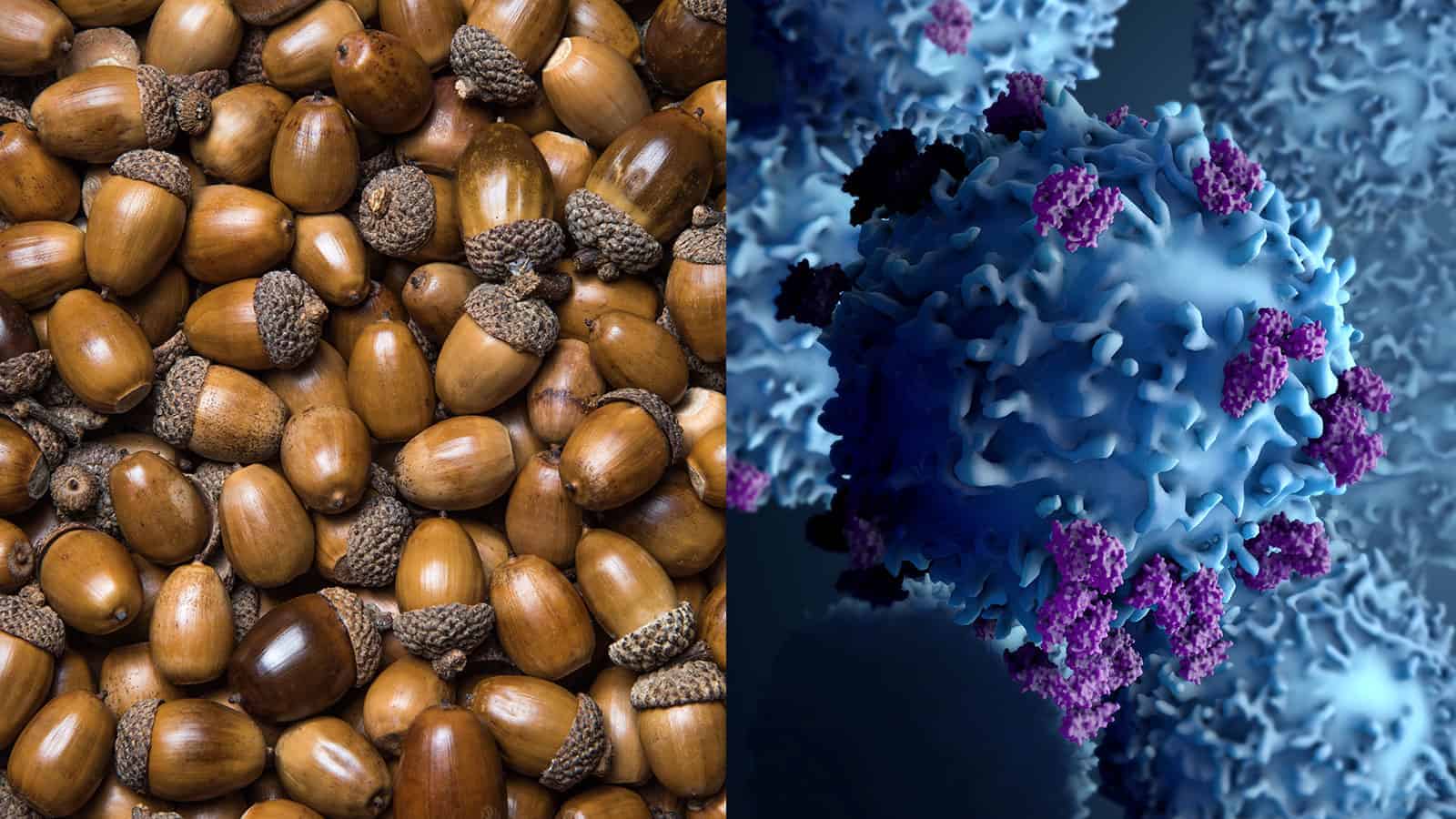When you hear about acorns, you probably think of squirrels before you think of roasting and grinding them into a flour for your diet. Most people probably don’t think about acorns at all unless it’s around the holiday season when people roast various nuts. Let alone the fact that research now indicates that they can fight some types of cancer.
Who knew acorns weren’t just for squirrels?
Recently, researchers revealed how acorns can fight cancer and aid in other health benefits. So yet again, Mother Nature provides another amazing health benefit right under our feet.
Nutritional Benefits of Acorns
Let’s take a look at answers to questions you probably have about how to add this nut into your diet.
1 – How do humans process acorns for eating?
As society is seeking more food sources that are natural, unprocessed, gluten-free, and nutritious, the acorn is getting a second look. Our distant ancestors used to eat acorns raw, roasted, leached and ground into a porridge, soup, coffee-like drink, and eventually, in bread.
Leaching is a method using water to rid the acorns of tannin. Tannin is a very bitter chemical in some foods which can stain your teeth, has been shown to lead to certain health risks, and is harsh on our digestive system. Tannin can inhibit the ability of our body to process nutrients, otherwise called an antinutrient. In fact, tannin proves itself useful for processing leather to make it waterproof.
Leaching is essentially the process of using either hot water or cold water, soaking and rinsing over the acorns repeatedly to wash the tannin out of the nut. The water will become colored a brown shade, and not until it runs clear have you removed the tannins completely. Also, you can research and find additional methods to rid acorns of this chemical.
2 – What are the health benefits of acorns?
While there are different varieties of acorns based on the type of oak tree they grow from, scientists were interested in discovering all the nutritional and health benefits of acorns and if any of them are depleted after leaching. Another factor under consideration was if the method of leaching made a difference and the form in which the acorn was in; had it been chopped, grounded, or was it whole during the process.
Overall, the study showed that leaching acorns, in all its forms, requires care to ensure that the nutrients and health benefits were not significantly decreased.
3 – What kind of nutritional benefit can we expect from this little nut?
It’s a fantastic source of fiber, with 4 grams per 1 ounce. It contains high levels of vitamins A, E, B6 plus iron, potassium, manganese, calcium, and folate. Most nuts are known for their high levels of fats, usually in the form of Omega 3’s. Acorns have a lower fat amount at 9 grams. The fatty acids consist primarily of linoleic, palmitic, and oleic. With all of that power in their punch, their value doesn’t stop there.
4 – How can Acorns fight cancer?
Phenols, a chemical compound, act as antioxidants. Antioxidants act against other molecules that have lost an electron and become unstable, labeled as free radicals. These free radicals can create mutations of other molecules and encourage other molecules to replicate in this altered stated. When free radicals become more abundant, a condition called oxidative stress results.
Free radicals can change lipids, proteins, and our DNA. At this point, they create diseases and illnesses, including potential cancer. Antioxidants fill in for that missing electron and therefore stabilize molecules, allowing them to act as intended.
Some types of antioxidants include bioflavonoids, tocopherols, resveratrol, and oregano oil. The antioxidant resveratrol is commonly found in nuts, including acorns. A separate study related to using acorn-flour showed acorns also contain flavonoids. All antioxidants have a strong scientific link to potentially preventing cancer and strengthening the immune system.
A study was published in 2015, also stating that phenols aid in acting as a contributor toward decreasing inflammation in the body. Inflammation is proving to be a significant factor related to many illnesses and diseases. By reducing inflammation in the body, people feel better and respond better to treatments.
Despite the necessity of leaching, the studies show that a significant amount of antioxidants remained in acorns. Also, it proved crucial to use saltwater in the leaching process to retain the highest level of phenols.
Fatty acids in this nut
In addition to phenols, acorns contain three different fatty acids; oleic acid, palmitic and linoleic oils. The number of oils differed depending upon which acorn species it was. Interestingly enough, linoleic and oleic acids are unsaturated fats.
Fatty acids are acids that the body cannot make itself and therefore, must be supplemented through our diet. We usually refer to them as essential fatty acids and alpha-linolenic acid or omega-3, and linoleic acid or omega-6 fatty acids. We tend to have a much higher intake of omega-6 fatty acids than omega-3.
Studies have been done due to concern that this imbalance was creating heart conditions through a higher intake of omega-6s. However, research has resulted in inconsistent results, and more studies show that omega-6s are just as beneficial to heart health.
Omega-3s are a crucial part of the membranes within cells of the body and also interact with the cell receptors and their functions. They have many functions they play a part in:
- Initiate hormone production to regulate blood clotting, contractions, and aiding the arterial walls to relax.
- Help reduce inflammation
- Attach themselves to the receptors in cells that control genetic function
Due to these abilities, the benefits for humans have proven to point to:
- Preventing heart disease and stroke by aiding the heart to beat in a consistent pattern without skipping or beating too fast.
- Potentially have a connection with controlling lupus
- Been linked to aiding with eczema, rheumatoid arthritis
- Studies show they may prevent cancer and other diseases or illnesses
- Higher doses have pointed toward lowering triglycerides and decreasing inflammation associated with atherosclerosis.
- Help in lowering blood pressure and heart rate
You’ll typically find Omega-3s in fish, vegetable oils, nuts, flaxseed nuts and oil, and leafy vegetables.
5 – Gut health contributions of acorns
Potential cancer prevention and amazing nutrition packed into a little package isn’t all the amazing acorn offers us. Additional studies link acorns to gut health and the prevention of Type 2 diabetes.
One such study published in the Journal of Nutritional Biochemistry in May of 2019. The researchers demonstrated that prebiotics from acorns and sago could prevent type 2 diabetes caused by a high-fat diet through the gut-brain connection. The researchers fed acorn and sago to mice and then studied the feces for microbes and to compare results against insulin. What they discovered was that not only did the acorn and sago preserve the beneficial microbes, but aided in cultivating more bacteria and short term fatty acids.
It resulted in creating glucose intolerance and insulin resistance in mice in a manner superior to what was seen in insulin fed mice. The scientists also noted that hyperpermeability and mucosal inflammation also declined. The overall conclusion was that it could be beneficial in preventing or treating diabetes type 2 created from obesity.
How to add acorns into your diet
For a nutritious, gluten-free punch to your diet, here is a recipe from Healthline on a recommended way to roast raw acorns:
- Only pick up or buy brown fully ripe acorns with the hat still attached. Green acorns contain too much tannin.
- Rinse the acorns free of any dirt, bugs, grass, etc. Discard any with wormholes or other evident pest damage.
- Using a nutcracker, crack the shells and remove the nut.
- Throw the acorn nut into a pot filled with water and boil for 5 minutes. The water will turn a dark brown. You’ll see the tannins release and darken the water. Strain the nuts from the water. Rinse and repeat until the water is clear.
You can eat the acorns after the water is clear. That’s because the clear water indicates you’ve removed the tannins. Next, you can roast them in the oven at 375°F (190°C) for 15–20 minutes, adding honey or other preferred spices afterward for added flavor.
You can grind dried acorns into a gluten-free flour or add them to wheat flour or another gluten-free flour for added texture, flavor, and nutrients.
 Final Thoughts on Eating Acorns for Your Health
Final Thoughts on Eating Acorns for Your Health
Acorns have been a part of humankind’s history stretching far back, only to have been left behind. It may be making a comeback due to researchers revealing how acorns can fight cancer through their antioxidants and essential omega-3s and 6’s. As an additive to gluten-free flour or regular wheat flour, it could be the dietary booster you’ve been looking for. Roasted on their own or mixed with dried fruit, they could make for a great snack as well!



















